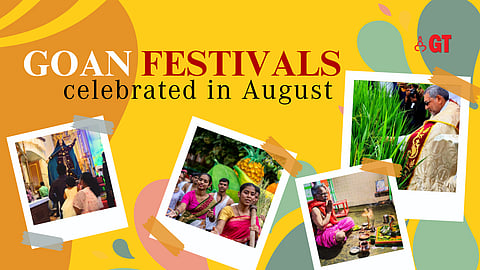

Goa is one state where the sun is figuratively always shining. Even the melancholy of incessant rainfall does little to dampen the joie de vivre of the people. Every month has something to celebrate, and August is no different. And if you know Goans, they only need an excuse to have a get-together with family and friends.
The cultural and religious bounty that Goa holds is reason enough for the plethora of festivals we have here. Apart from culture and religion, we also have several national holidays that unite the entire state as one tightly knit community.
1. PATOLLEANCHEM FEST
One of the most relished delicacies prepared specially during the monsoon season is the Goan patoleo. These are simply made using rice flour that's applied to turmeric leaves and stuffed with a filling of coconut and jaggery (the mix is locally known as chunn). The steamed patoleos can then be enjoyed as snack at tea time or as dessert.
On the feast of the Assumption of Our Lady (a universal feast in the Roman Catholic Church), celebrated on August 15 across the state, patoleos are widely prepared in Catholic households.
There is a tradition where each family member participates in the preparation, which is then distributed among neighbours and friends.
2. KONSACHEM FEST
In Goa, the new harvest of the season is celebrated by making an offering to God. A tradition that has come down from our ancestors, it is a way of thanking God for sufficient rainfall which results in a good harvest.
The first harvest feast is celebrated in Our Lady of Snows Church in the village of Raia in the first week of August. On the following Sundays, parishioners of Taleigao and Divar also celebrate the feast with great devotion.
In a Eucharistic celebration, the parishioners along with the priest head to a nearby cultivated field where the priest blesses the field, offers prayers and cuts the paddy. It is then distributed among the crowds and placed at the altar in Goan households.
3. NAG PANCHAMI
Nag panchami is a festival devoted to the worship of snakes. It’s a festival celebrated across the country. In Goa too, the Hindu community celebrates it with great zeal.
This year the festival will be celebrated on August 21. On this day, snake idols are worshipped and are offered milk and sweets.
Although there are different stories as to how the day came to be celebrated, it is believed that in the bygone days, as the farming community carried out their work in the fields, they’d often encounter snakes, and some were even bitten by them. So, for safety they’d pray to the nag (snake).
On this day, many don’t engage in any ploughing activity as it is considered bad luck.
Patoleos are enjoyed by the Hindu community during the festival of Nag Panchami.
4. BONDERAM
The traditional festival of flags celebrated on the Island of Divar, Bonderam is one of the most awaited events of the season. The festivities begin with a flag parade around the village, followed by some traditional games like breaking the coconut and more.
Local participation in competitions, like the fancy dress that's held across all age groups, is also witnessed.
While the brass band adds to the festive mood, each ward in the village puts up a themed float accompanied with dancers that groove to every beat of the Konkani tunes. The night witnesses more fun and celebration with a live band or DJ putting up a show for the revellers.
This year, Bonderam, organised by the Sao Matias Sports Club, will be held on August 19, while the one organised by the Piedade Youth Association will be held on August 26.
5. RAKSHA BANDHAN
The traditional festival of Raksha Bandhan celebrates the affectionate bond between brothers and sisters. No matter the sibling rivalry for the rest of the year, on this day the fondness and love between them is witnessed as sisters tie rakhis on the wrists of their brothers’ hands. With this, a promise of protection is strengthened each year.
Nowadays rakhis are easily available at market stores, but many sisters make handmade rakhis for the auspicious day. Wearing these colourful, one-of-a-kind rakhis, brothers flaunt them as they go about their day.
A brother is also expected to give some sort of a gift to his sister in return. This year the festival will be celebrated on August 30.